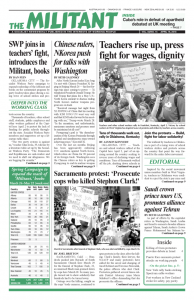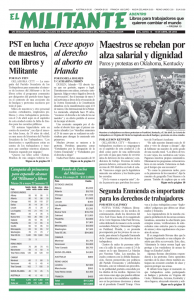After North Korean leader Kim Jong Un met with Chinese President Xi Jinping in Beijing March 26 — his first foreign trip since coming to power — Xi telephoned President Donald Trump. He told Trump that plans for a May U.S.-North Korea summit to discuss ending North Korea’s nuclear weapons program are on track.
“Received message last night from XI JINPING of China that his meeting with KIM JONG UN went very well and that KIM looks forward to his meeting with me,” Trump wrote March 28. “In the meantime, and unfortunately, maximum sanctions and pressure must be maintained at all cost!”
Pyongyang’s goal is “the denuclearization of the Korean Peninsula through gradual and simultaneous steps toward achieving peace,” Kim told Xi.
Over the last six months Beijing has been aggressively enforcing U.N. sanctions against North Korea, which relies on China for 90 percent of its foreign trade. Washington sees the Chinese rulers as key to getting Pyongyang to end its nuclear weapon and missile programs.
At the urging of Washington and with the backing of Beijing, the U.N. Security Council March 30 blacklisted 27 ships and 21 shipping companies accused of involvement in oil or coal trade with North Korea.
The Financial Times reports that shipments of refined oil from China to North Korea were slashed 99 percent in January and February. Chinese coal exports to North Korea — which averaged 8,600 tons a month in 2017 — plummeted to zero. Steel exports fell to 257 tons a month, from more than 15,000 tons. A number of North Korean factories have been forced to close and thousands of workers have been laid off.
The Chinese rulers are seeking détente between Washington and Pyongyang, to achieve a measure of stability in the region. They want to prevent an economic and political collapse in North Korea, which could lead to a flood of refugees and to U.S. imperialist troops on its borders.
Korea divided against will of its people
At the end of the second imperialist world war and the end of the Japanese occupation of Korea, Korean workers and farmers rebelled. U.S. troops occupied the South, with the agreement of Moscow, and installed the dictatorship of Syngman Rhee, who imposed a reign of terror, killing tens of thousands and drowning their uprising in blood. But in the North, working people succeeded in overturning the power of the capitalists and landlords.
Washington’s provocations led to the 1950-53 Korean War, where some 4 million people were killed. U.S.-led troops, fighting under the U.N. flag, drove North Korean forces almost to the Chinese border. With the aid of tens of thousands of Chinese volunteers, the North Koreans fought the U.S. troops back to the 38th parallel, dealing U.S. imperialism its first-ever military defeat.
The U.S. government violated the terms of the 1953 cease-fire by placing nuclear weapons in South Korea in 1958, keeping them there until 1991. South Korea remains under the U.S. rulers’ nuclear “umbrella” and the Pentagon still deploys nuclear-armed submarines in nearby waters. Washington has refused for 65 years to sign a formal peace treaty with Pyongyang.
When Pyongyang began testing nuclear weapons — and threatening the South with a “rain of fire” — it dealt a blow to its moral high ground against U.S. imperialism’s brutality.
Both North Korea and Washington have moved over the last several months to ease military tensions. Pyongyang has not conducted any nuclear tests since Sept. 3. Washington in turn postponed to April 1 and scaled down its provocative annual joint military maneuvers with South Korea to facilitate talks. Washington cut the duration of the Operation Foal Eagle war games in half. They began April 1 and unlike previous years will not include U.S. aircraft carriers or nuclear submarines.
Desire for reunification can’t be quelled
Leading up to the talks between Washington and Pyongyang, South Korean President Moon Jae-in and North Korean leader Kim are planning an April 27 summit. Tokyo also wants to meet with Pyongyang.
Ever since the U.S. occupation, the Korean people have thirsted for reunification. Since the reunification of Vietnam and Germany the division of Korea is the one national division remaining from World War II.
At this year’s Winter Olympics in Pyeongchang, South Korea, a large delegation from the North created quite a stir. This week Seoul sent 120 people to the North, including music groups, government officials, reporters and a taekwondo demonstration team, for concerts April 1 and 3 in Pyongyang. The South Korean female K-Pop group Red Velvet sang “Our Hope Is Unification,” and the audience joined in.
Kim Jong Un attended and was introduced to the performers. He proposed that North Korean musicians perform in Seoul in the fall.

